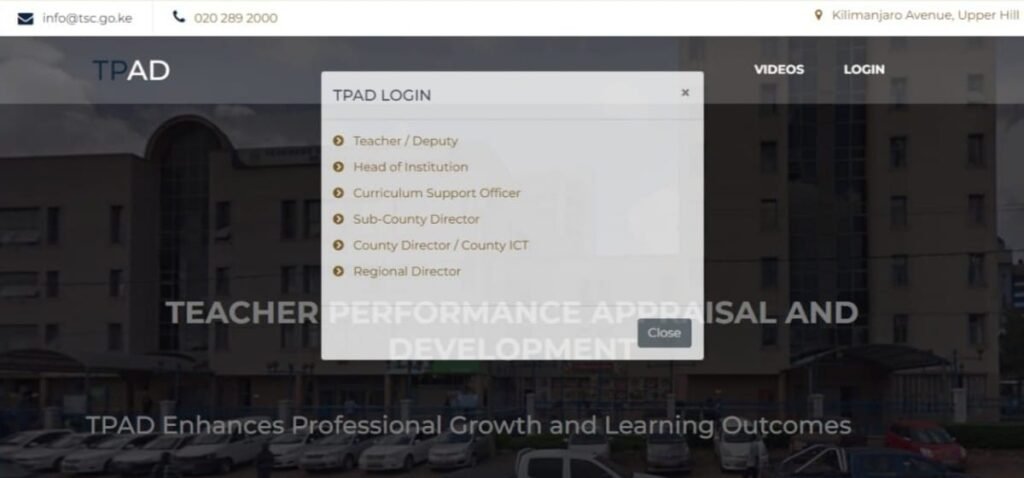Understanding Teacher Performance Appraisals in Your First Year

A section of TPAD from TSC website

Introduction
Teacher performance appraisals play a crucial role in the educational landscape, serving as a formal evaluation of a teacher’s effectiveness in the classroom. For new teachers, these appraisals are especially relevant, as they often coincide with initial experiences in the teaching profession. The TSC appraisal system, which governs these evaluations, aims to foster teacher professional development and provide constructive feedback for teacher improvement. These evaluations not only assist in assessing a teacher’s current performance but also support their career growth by identifying areas for development.
During the first year of teaching, educators are often faced with the challenge of adapting to various teaching environments, managing classroom dynamics, and meeting diverse student needs. Therefore, preparing for performance appraisal can be daunting yet essential. The appraisals for new teachers are not only about assessing competence but also about aiding the transition into the profession and equipping educators with new teacher appraisal tips that can enhance their teaching strategies.
Moreover, excelling in appraisals is instrumental for new teachers, as positive evaluations can pave the way for future career opportunities. Understanding the TSC performance evaluation process enables newcomers to approach these assessments with confidence. Engaging with peers and mentors can provide insightful feedback that contributes to ongoing teacher professional development. Establishing a growth mindset from the outset can lead to a successful teaching career, driven by a commitment to personal improvement and responsiveness to the appraisal process.
In light of these considerations, teacher performance appraisals represent a foundational element for new educators, guiding them through their early professional journey and laying the groundwork for effective teaching practice.
Overview of the TSC Teacher Performance Appraisal System
The Teacher Service Commission (TSC) performance appraisal system is a framework designed to evaluate and enhance the performance of educators. It was established with the aim of ensuring accountability and identifying areas for professional growth among teachers. The system has evolved over the years, adapting to the changing educational landscape and the need for quality teaching. Understanding this appraisal system is crucial for new educators, as it lays the foundation for their teacher career growth in the initial stages of their profession.
The main objectives of the TSC appraisal system are to improve teaching quality, promote teacher development, and ensure that there is a robust mechanism for providing feedback for teacher improvement. This entails a structured evaluation process, which involves setting clear performance indicators that align with national educational standards. New teachers can benefit significantly from engaging with this system, as it offers them insights into their strengths and areas that may require additional focus.
The appraisal process is structured to encompass both formative and summative assessments. Formative assessments provide continuous feedback throughout the teaching year, allowing educators to make timely adjustments to their teaching strategies. Summative assessments, typically carried out at the end of the appraisal period, evaluate overall performance based on set criteria. A crucial feature of the TSC performance evaluation is the emphasis on teacher reflection and self-assessment, which empowers educators to take charge of their professional development.
For novice teachers, familiarizing themselves with the TSC appraisal system is essential for preparing for performance appraisal effectively. By understanding the framework and expectations outlined within this system, educators can approach their appraisals with confidence and clarity, ultimately excelling in appraisals and enhancing their prospects for career advancement.
Importance of Appraisals
Teacher performance appraisals play a critical role in fostering both individual development and institutional effectiveness within educational environments. These assessments serve as a benchmark for evaluating teacher effectiveness, allowing for a comprehensive analysis of instructional practices. By setting clear standards, performance appraisals enhance educational quality and help schools maintain accountability standards. This accountability is essential not only for the teachers themselves but also for the broader educational community that relies on continuous improvement.
Moreover, the TSC appraisal system is designed to support teacher career growth by identifying strengths and areas for improvement. Through constructive feedback for teacher improvement, educators can focus on specific competencies that need development. This is particularly significant for new teachers, who might benefit from guidance and mentorship during their formative years. New teacher appraisal tips encourage reflective practices, leading to enhanced instructional methodologies and improved student outcomes.
Performance appraisals also provide insight into the effectiveness of professional development initiatives. By aligning appraisals with professional development opportunities, institutions not only validate their training programs but also create a culture of learning among educators. This, in turn, boosts morale and fosters an environment that encourages excellence in appraisals. Furthermore, the emphasis on preparing for performance appraisal helps teachers feel more equipped and confident, resulting in a more positive appraisal experience.
In a broader context, performance evaluations, such as the TSC performance evaluation, contribute to creating an informed educational landscape. Through structured appraisals for new teachers, institutions can accurately assess and support their development, ensuring that educators are equipped with the skills necessary for success in the classroom. Overall, the importance of performance appraisals cannot be overstated; they are essential for advancing educational standards and ensuring the continuous improvement of teachers and institutions alike.
How Appraisals Work

The performance appraisal process for teachers is a structured and systematic approach to assess their effectiveness and identify areas for professional growth. It generally begins with the establishment of clear performance criteria that align with the educational goals of the institution and the expectations of the TSC appraisal system. These criteria may include aspects such as lesson planning, classroom management, student engagement, and overall contribution to the school environment.
During the appraisal cycle, various assessment methods are employed to gather data on teacher performance. Observations are a common tool; administrators or peer evaluators conduct classroom visits to evaluate teaching strategies and student interactions. Administrators may use a standardized rubric to ensure a consistent evaluation framework. Additionally, self-reflection plays a crucial role in this process, encouraging teachers to analyze their instructional practices and assess their effectiveness critically.
The feedback gathered from observations might also incorporate input from students and parents, providing a holistic view of a teacher’s impact. Further, teachers may be asked to submit documentation, such as lesson plans and student work samples, as evidence of their teaching practices. This documentation supports a comprehensive understanding of a teacher’s performance, essential for excelling in appraisals.
After the evaluation process, constructive feedback is provided to teachers, emphasizing strengths and areas for improvement. This feedback is critical for teacher professional development, guiding new teachers specifically through their career growth. Moreover, it helps educators in preparing for performance appraisal cycles in subsequent years. As teachers receive regular feedback focused on improvement, they are better positioned to advance their skills, ultimately contributing to overall student success.
Preparing for Appraisals
Preparing for performance appraisal is a crucial step for new teachers as it directly influences their professional development and career growth within the educational institution. To begin this process, it is advisable to set clear and achievable professional goals. These goals should align with the standards of the TSC appraisal system, enabling you to focus on specific areas of improvement and development. Consider utilizing the SMART criteria—Specific, Measurable, Achievable, Relevant, and Time-bound—to refine these objectives and ensure they contribute meaningfully to your teaching practice.
Documenting achievements plays a vital role in showcasing your effectiveness as an educator. As you progress through your teaching journey, it is important to keep an organized record of your accomplishments, class projects, and student outcomes. Utilize portfolios or digital documentation tools to compile evidence of your teaching effectiveness, including lesson plans, student feedback, and engagement metrics. This evidence is instrumental in demonstrating your contributions to the learning environment and serves as concrete support during teacher performance appraisals.
Gathering feedback for teacher improvement is another essential strategy. Engaging in peer observations or seeking constructive feedback from mentors provides insights into your teaching techniques and classroom management skills. This process not only fosters a collaborative environment but also helps you identify areas where further development or adaptation may be necessary. Moreover, actively participating in professional development workshops can enrich your pedagogical skills and prepare you more thoroughly for the TSC performance evaluation.
By proactively setting goals, documenting achievements, and seeking feedback, you will not only excel in appraisals but also enhance your overall teaching practice. These strategies are pivotal in laying the groundwork for meaningful teacher professional development and ensuring a successful start to your teaching career. You can also understand how TPAD works here
Tips to Excel in Your First Appraisal as a New Teacher
Entering the teaching profession can be both exhilarating and daunting, particularly when preparing for your first performance appraisal. To excel in this evaluation, new teachers can adopt several strategies that highlight their strengths and address areas for improvement. One key approach is to actively seek and embrace feedback for teacher improvement. Engaging with mentors, colleagues, and even students allows you to gain different perspectives on your teaching practices, which can strengthen your overall teaching performance.
Additionally, familiarize yourself with the TSC appraisal system and the specific criteria used for teacher performance appraisals. Understanding these benchmarks will enable you to tailor your lesson plans and classroom management techniques to meet these standards effectively. Documenting your achievements and improvements in a reflective teaching journal can also serve as a valuable tool during your evaluation. This record showcases your commitment to teacher professional development as well as your growth in areas identified during previous evaluations.
An equally important aspect is building rapport with your appraisers. Approach them with openness and honesty, expressing a willingness to learn and adapt to feedback. This can significantly enhance your evaluation experience. Furthermore, prioritize preparation for performance appraisal by organizing your documents, lesson plans, and student data in an accessible manner. Having a well-organized portfolio can illustrate not only your achievements but also your dedication to teacher career growth.
Lastly, as you prepare to report on your progress, emphasize your engagement in collaborative activities and professional learning communities. Showcasing your willingness to be involved in school initiatives reflects positively on your capabilities as an educator and positions you as a valuable member of the teaching staff. By following these new teacher appraisal tips, you will be better equipped to navigate your first appraisal, ensuring that you excel and lay a solid foundation for your teaching career.
Using Feedback for Improvement
Receiving feedback during teacher performance appraisals is an invaluable component of professional growth, particularly for new teachers. It is essential to interpret feedback constructively, as it serves not only to highlight areas needing improvement but also to showcase your strengths. In the context of the TSC appraisal system, feedback can often stem from multiple sources, including peer reviews, self-assessments, and student evaluations. This multifaceted approach enhances the credibility of the evaluations and provides a comprehensive view of your teaching practices.
To make the most out of your feedback, start by reflecting on the comments and suggestions given during your performance evaluation. Identify the specific areas highlighted for improvement and relate them to your overall teaching philosophy. Setting new goals based on constructive feedback is a crucial step in the journey of teacher career growth. Establish SMART goals—Specific, Measurable, Achievable, Relevant, and Time-bound—that focus on the areas indicated in your performance appraisal. This structured approach not only promotes continuous improvement but also facilitates meaningful conversations about your progress during subsequent appraisals.
Additionally, seeking further professional development opportunities can amplify the benefits of feedback received. Whether this involves attending workshops, enrolling in courses focused on teaching strategies, or participating in professional learning communities, engaging in these activities can enhance your skills and effectiveness as an educator. Participating in such programs is often seen as an essential aspect of excelling in appraisals.
Ultimately, the feedback received from teacher appraisal processes is a tool for teacher improvement. By embracing this feedback and actively seeking opportunities for professional development, you will be better prepared for future performance appraisals and contribute positively to your growth as a teacher within the educational framework.
Conclusion
Teacher performance appraisals play a critical role in the professional landscape for educators, particularly for those in their first year. Rather than perceiving appraisals as stressful evaluations, teachers should embrace them as valuable opportunities for personal and professional growth. The TSC appraisal system is designed not only to assess performance but also to facilitate teacher career growth through constructive feedback and targeted support.
Preparing for performance appraisal can initially seem daunting. However, by adopting a proactive approach and utilizing new teacher appraisal tips, educators can set themselves up for success. Engaging with mentors and peers for feedback can help foster an environment conducive to improvement, making the appraisal process less intimidating. Understanding that these evaluations aim to highlight unrecognized strengths and areas for development can help alleviate any anxiety surrounding feedback for teacher improvement.
Excelling in appraisals forms a cornerstone of teacher professional development. New teachers can leverage insights gained from their performance evaluations to inform their teaching practices, encourage collaboration, and cultivate a growth mindset. Ultimately, appraisals for new teachers should be viewed as a supportive measure, rather than a judgment, helping educators to refine their skills and enhance their teaching effectiveness. By fostering a positive relationship with the TSC performance evaluation process, teachers can establish a strong foundation for their future in education.
In conclusion, teacher performance appraisals are integral to both individual and collective educational advancement. By recognizing the potential of these evaluations as tools for growth, new teachers will find they not only enhance their own practice but contribute positively to their learning communities. This perspective will encourage a more fulfilling and successful journey throughout their teaching careers.







